The Cambridge History of China. Vol. 06. Alien Regimes and Border States, 907-1368
Подождите немного. Документ загружается.

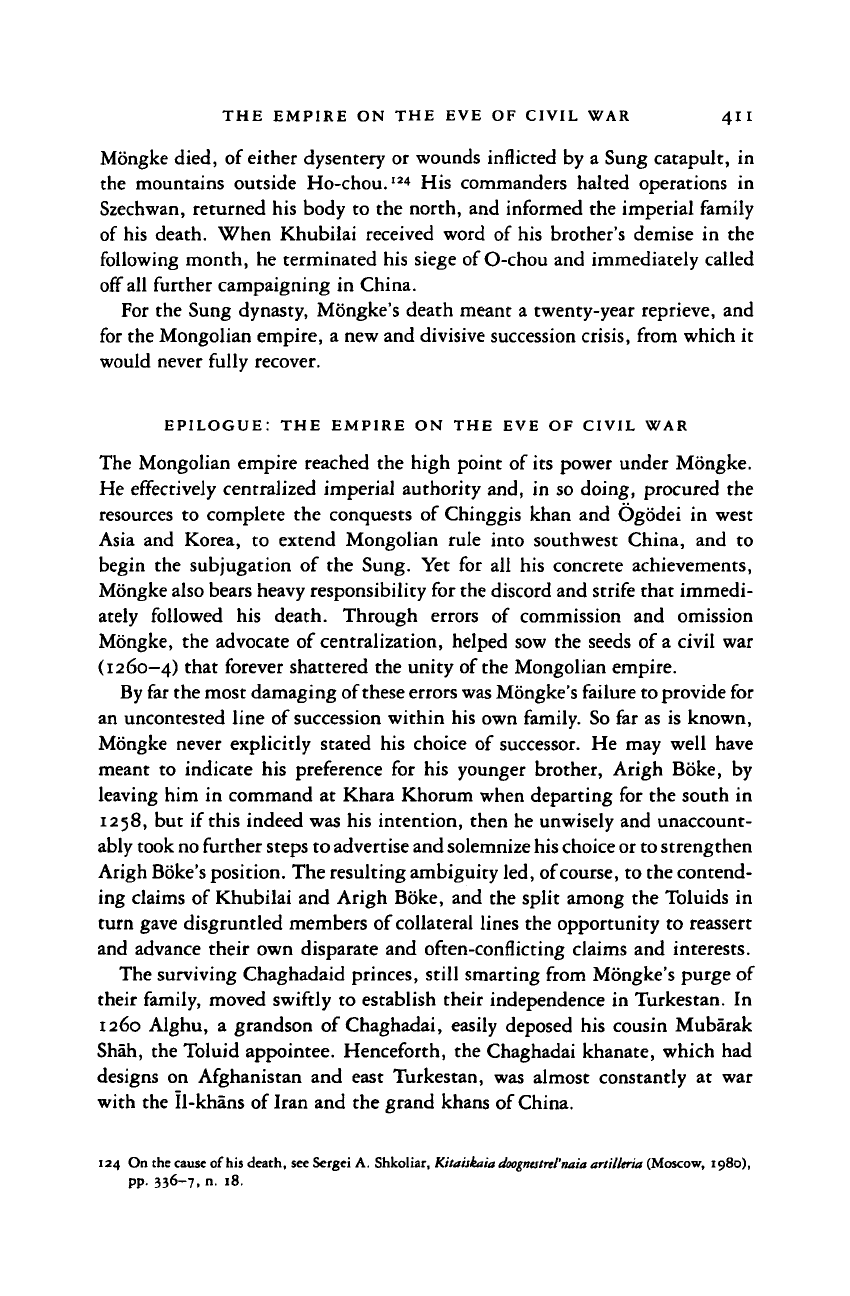
THE EMPIRE ON THE EVE OF CIVIL WAR 411
Mongke died, of either dysentery or wounds inflicted by a Sung catapult, in
the mountains outside Ho-chou.
124
His commanders halted operations in
Szechwan, returned his body to the north, and informed the imperial family
of his death. When Khubilai received word of his brother's demise in the
following month, he terminated his siege of O-chou and immediately called
off
all
further campaigning in China.
For the Sung dynasty, Mongke's death meant a twenty-year reprieve, and
for the Mongolian empire, a new and divisive succession crisis, from which it
would never fully recover.
EPILOGUE:
THE EMPIRE ON THE EVE OF CIVIL WAR
The Mongolian empire reached the high point of its power under Mongke.
He effectively centralized imperial authority and, in so doing, procured the
resources to complete the conquests of Chinggis khan and Ogodei in west
Asia and Korea, to extend Mongolian rule into southwest China, and to
begin the subjugation of the Sung. Yet for all his concrete achievements,
Mongke also bears heavy responsibility for the discord and strife that immedi-
ately followed his death. Through errors of commission and omission
Mongke, the advocate of centralization, helped sow the seeds of a civil war
(1260—4) that forever shattered the unity of the Mongolian empire.
By
far the most damaging of these errors
was
Mongke's failure to provide for
an uncontested line of succession within his own family. So far as is known,
Mongke never explicitly stated his choice of successor. He may well have
meant to indicate his preference for his younger brother, Arigh Boke, by
leaving him in command at Khara Khorum when departing for the south in
1258,
but if this indeed was his intention, then he unwisely and unaccount-
ably took
no
further steps to advertise and solemnize
his
choice or to strengthen
Arigh Boke's position. The resulting ambiguity led, of course, to the contend-
ing claims of Khubilai and Arigh Boke, and the split among the Toluids in
turn gave disgruntled members of collateral lines the opportunity to reassert
and advance their own disparate and often-conflicting claims and interests.
The surviving Chaghadaid princes, still smarting from Mongke's purge of
their family, moved swiftly to establish their independence in Turkestan. In
1260 Alghu, a grandson of Chaghadai, easily deposed his cousin Mubarak
Shah, the Toluid appointee. Henceforth, the Chaghadai khanate, which had
designs on Afghanistan and east Turkestan, was almost constantly at war
with the Il-khans of Iran and the grand khans of China.
124 On the cause of his death, see Sergei A. Shkoliar, Kilaiskaia doognatnl'naia artilleria (Moscow, 1980),
PP-
336-7. n. 18.
Cambridge Histories Online © Cambridge University Press, 2008
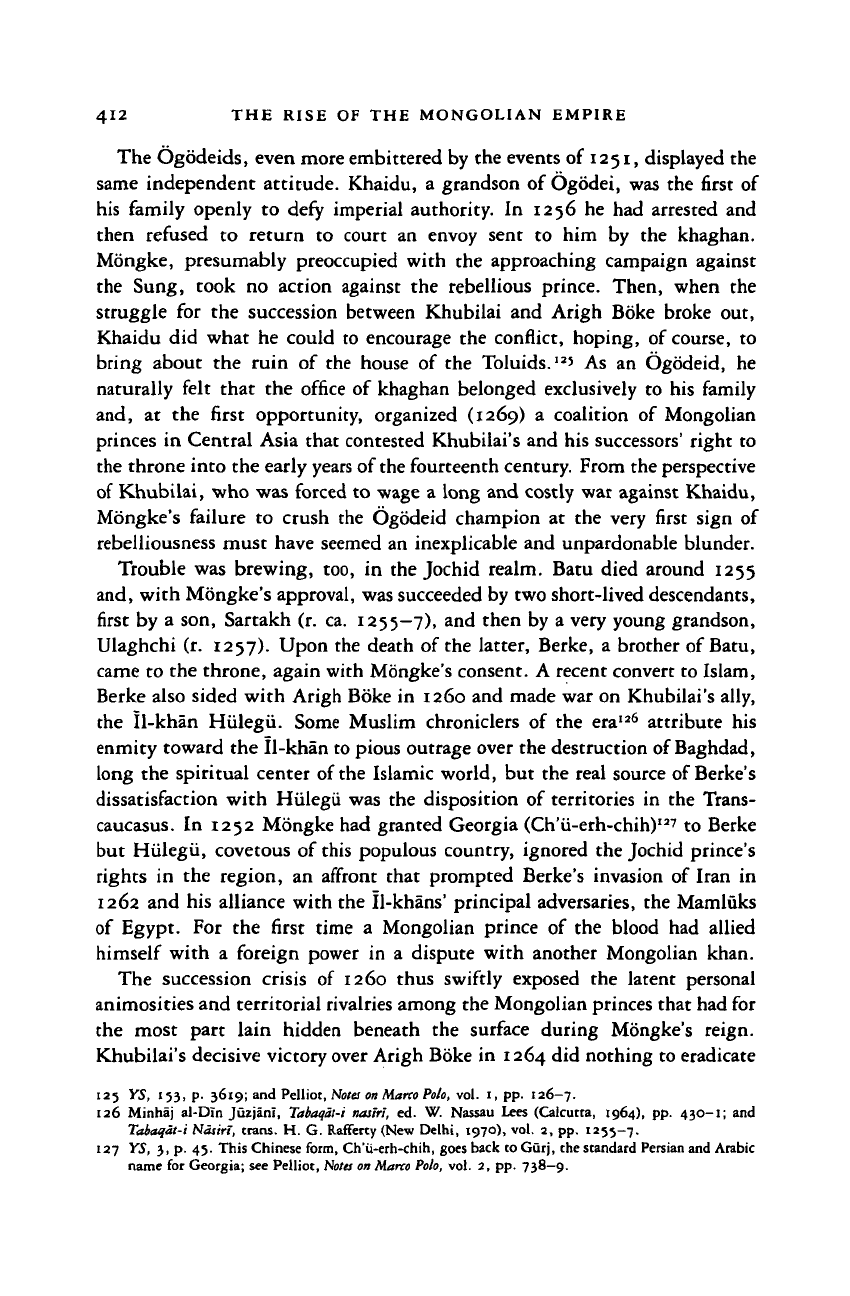
412 THE RISE OF THE MONGOLIAN EMPIRE
The Ogodeids, even more embittered by the events of
1251,
displayed the
same independent attitude. Khaidu, a grandson of Ogodei, was the first of
his family openly to defy imperial authority. In 1256 he had arrested and
then refused to return to court an envoy sent to him by the khaghan.
Mongke, presumably preoccupied with the approaching campaign against
the Sung, took no action against the rebellious prince. Then, when the
struggle for the succession between Khubilai and Arigh Boke broke out,
Khaidu did what he could to encourage the conflict, hoping, of course, to
bring about the ruin of the house of the Toluids.
12
' As an Ogodeid, he
naturally felt that the office of khaghan belonged exclusively to his family
and, at the first opportunity, organized (1269) a coalition of Mongolian
princes in Central Asia that contested Khubilai's and his successors' right to
the throne into the early years of
the
fourteenth century. From the perspective
of Khubilai, who was forced to wage a long and costly war against Khaidu,
Mongke's failure to crush the Ogodeid champion at the very first sign of
rebelliousness must have seemed an inexplicable and unpardonable blunder.
Trouble was brewing, too, in the Jochid realm. Batu died around 1255
and, with Mongke's approval, was succeeded by two short-lived descendants,
first by a son, Sartakh (r. ca. 1255—7), and then by a very young grandson,
Ulaghchi (r. 1257). Upon the death of the latter, Berke, a brother of Batu,
came to the throne, again with Mongke's consent. A recent convert to Islam,
Berke also sided with Arigh Boke in 1260 and made war on Khubilai's ally,
the Il-khan Hiilegii. Some Muslim chroniclers of the era
126
attribute his
enmity toward the Il-khan to pious outrage over the destruction of Baghdad,
long the spiritual center of the Islamic world, but the real source of Berke's
dissatisfaction with Hiilegu was the disposition of territories in the Trans-
caucasus. In 1252 Mongke had granted Georgia (Ch'ii-erh-chih)
127
to Berke
but Hiilegii, covetous of this populous country, ignored the Jochid prince's
rights in the region, an affront that prompted Berke's invasion of Iran in
1262 and his alliance with the Il-khans' principal adversaries, the Mamluks
of Egypt. For the first time a Mongolian prince of the blood had allied
himself with a foreign power in a dispute with another Mongolian khan.
The succession crisis of 1260 thus swiftly exposed the latent personal
animosities and territorial rivalries among the Mongolian princes that had for
the most part lain hidden beneath the surface during Mongke's reign.
Khubilai's decisive victory over Arigh Boke in 1264 did nothing to eradicate
125 YS, 153, p. 3619; and Pelliot,
Notes on Marco
Polo,
vol. i, pp. 126-7.
126 Minhaj al-Din JuzjanI,
Tabaqat-i
nasiri, ed. W. Nassau Lees (Calcutta, 1964), pp.
430-1;
and
Tabaqat-iNasirT, trans. H. G. Rafferty(New Delhi, 1970), vol. 2, pp. 1255-7.
127 YS, 3, p. 45. This Chinese form, Ch'ii-erh-chih, goes back to
Gurj,
the standard Persian and Arabic
name for Georgia; see Pelliot,
Notes on Marco
Polo,
vol. 2, pp. 738-9.
Cambridge Histories Online © Cambridge University Press, 2008
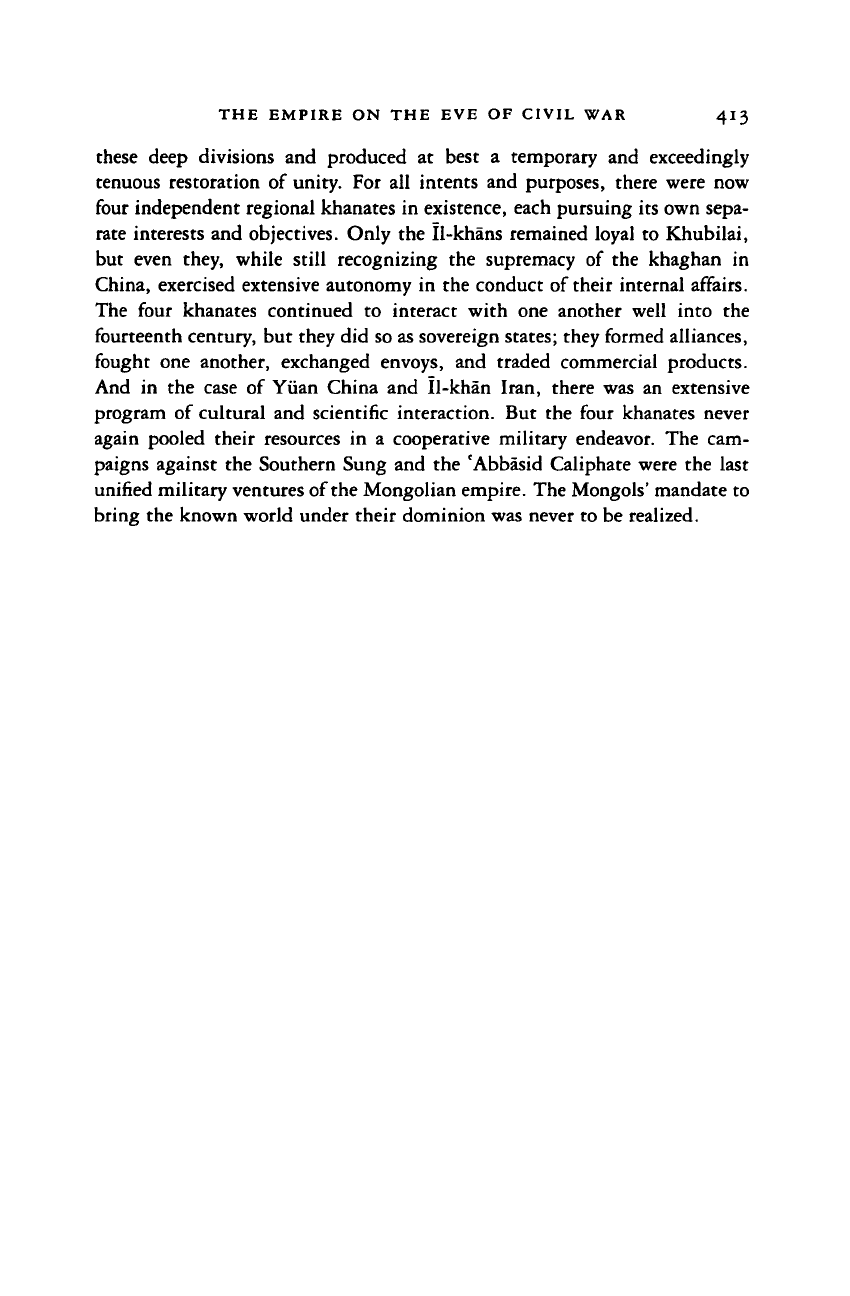
THE EMPIRE ON THE EVE OF CIVIL WAR 413
these deep divisions and produced at best a temporary and exceedingly
tenuous restoration of unity. For all intents and purposes, there were now
four independent regional khanates in existence, each pursuing its own sepa-
rate interests and objectives. Only the Il-khans remained loyal to Khubilai,
but even they, while still recognizing the supremacy of the khaghan in
China, exercised extensive autonomy in the conduct of their internal affairs.
The four khanates continued to interact with one another well into the
fourteenth century, but they did so as sovereign states; they formed alliances,
fought one another, exchanged envoys, and traded commercial products.
And in the case of Yuan China and Il-khan Iran, there was an extensive
program of cultural and scientific interaction. But the four khanates never
again pooled their resources in a cooperative military endeavor. The cam-
paigns against the Southern Sung and the 'Abbasid Caliphate were the last
unified military ventures of the Mongolian empire. The Mongols' mandate to
bring the known world under their dominion was never to be realized.
Cambridge Histories Online © Cambridge University Press, 2008
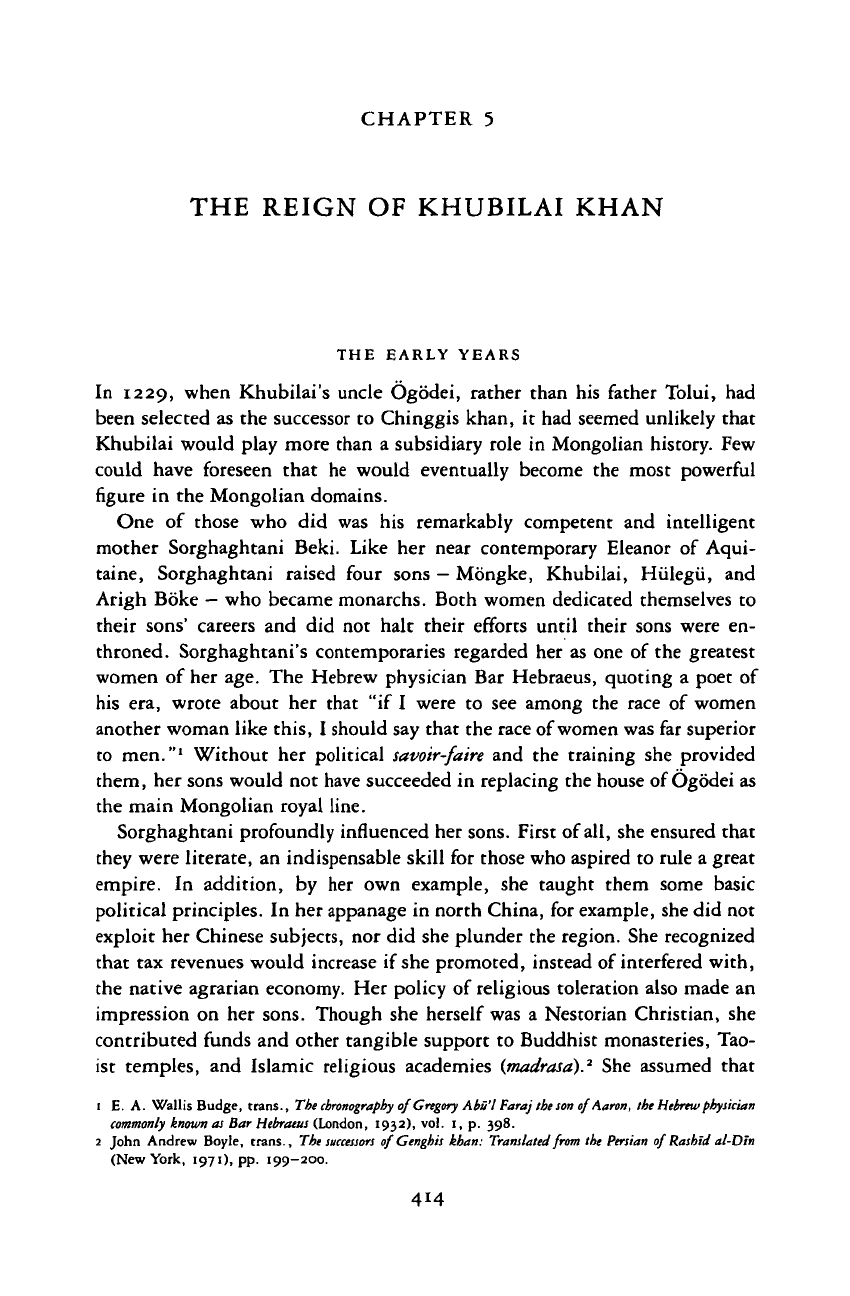
CHAPTER
5
THE REIGN
OF
KHUBILAI KHAN
THE EARLY YEARS
In
1229,
when Khubilai's uncle Ogodei, rather than
his
father Tolui,
had
been selected
as the
successor
to
Chinggis khan,
it
had seemed unlikely that
Khubilai would play more than
a
subsidiary role
in
Mongolian history.
Few
could have foreseen that
he
would eventually become
the
most powerful
figure in the Mongolian domains.
One
of
those
who did was his
remarkably competent
and
intelligent
mother Sorghaghtani Beki. Like
her
near contemporary Eleanor
of
Aqui-
taine, Sorghaghtani raised four sons
—
Mongke, Khubilai, Hiilegii,
and
Arigh Boke
—
who became monarchs. Both women dedicated themselves
to
their sons' careers
and did not
halt their efforts until their sons were
en-
throned. Sorghaghtani's contemporaries regarded
her as
one
of
the greatest
women
of
her age.
The
Hebrew physician
Bar
Hebraeus, quoting
a
poet
of
his
era,
wrote about
her
that
"if I
were
to see
among
the
race
of
women
another woman like this,
I
should say that the race of women was
far
superior
to men."
1
Without
her
political
savoir-faire
and the
training
she
provided
them, her sons would
not
have succeeded
in
replacing the house of Ogodei as
the main Mongolian royal line.
Sorghaghtani profoundly influenced her sons. First of
all,
she ensured that
they were literate,
an
indispensable skill
for
those who aspired
to
rule a great
empire.
In
addition,
by her own
example,
she
taught them some basic
political principles.
In
her appanage
in
north China, for example, she did not
exploit her Chinese subjects, nor
did
she plunder the region. She recognized
that
tax
revenues would increase
if
she
promoted, instead
of
interfered with,
the native agrarian economy.
Her
policy
of
religious toleration also made
an
impression
on her
sons. Though
she
herself was
a
Nestorian Christian,
she
contributed funds and other tangible support
to
Buddhist monasteries, Tao-
ist temples,
and
Islamic religious academies
(madrasa).
2
She
assumed that
1
E. A.
Wallis Budge, trans., The
cbronography
of Gregory Abu'l Faraj the
son
of Aaron, the
Hebrew
physician
commonly known
as Bar
Hebraeus (London, 1932),
vol. 1, p. 398.
2 John Andrew Boyle, trans.,
The
successors
of
Genghis khan: Translated from
the
Persian
of
Rashid al-Din
(New York, 1971),
pp.
199—200.
414
Cambridge Histories Online © Cambridge University Press, 2008
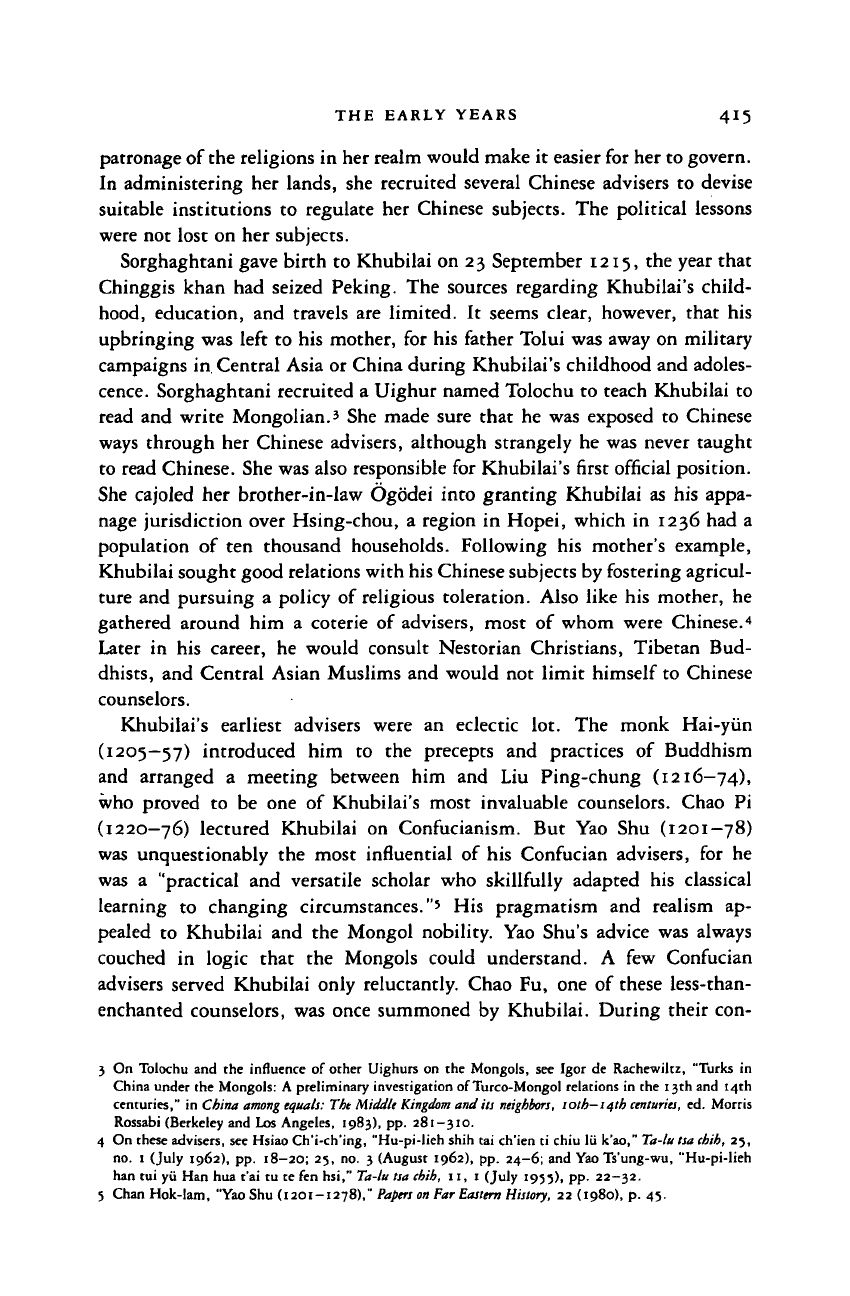
THE EARLY YEARS 415
patronage of the religions in her realm would make it easier for her to govern.
In administering her lands, she recruited several Chinese advisers to devise
suitable institutions to regulate her Chinese subjects. The political lessons
were not lost on her subjects.
Sorghaghtani gave birth to Khubilai on 23 September 1215, the year that
Chinggis khan had seized Peking. The sources regarding Khubilai's child-
hood, education, and travels are limited. It seems clear, however, that his
upbringing was left to his mother, for his father Tolui was away on military
campaigns
in.
Central Asia or China during Khubilai's childhood and adoles-
cence. Sorghaghtani recruited a Uighur named Tolochu to teach Khubilai to
read and write Mongolian.3 She made sure that he was exposed to Chinese
ways through her Chinese advisers, although strangely he was never taught
to read Chinese. She was also responsible for Khubilai's first official position.
She cajoled her brother-in-law Ogodei into granting Khubilai as his appa-
nage jurisdiction over Hsing-chou, a region in Hopei, which in 1236 had a
population of ten thousand households. Following his mother's example,
Khubilai sought good relations with his Chinese subjects by fostering agricul-
ture and pursuing a policy of religious toleration. Also like his mother, he
gathered around him a coterie of advisers, most of whom were Chinese.
4
Later in his career, he would consult Nestorian Christians, Tibetan Bud-
dhists, and Central Asian Muslims and would not limit himself to Chinese
counselors.
Khubilai's earliest advisers were an eclectic lot. The monk Hai-yiin
(1205-57) introduced him to the precepts and practices of Buddhism
and arranged a meeting between him and Liu Ping-chung (1216-74),
who proved to be one of Khubilai's most invaluable counselors. Chao Pi
(1220—76) lectured Khubilai on Confucianism. But Yao Shu (1201—78)
was unquestionably the most influential of his Confucian advisers, for he
was a "practical and versatile scholar who skillfully adapted his classical
learning to changing circumstances."' His pragmatism and realism ap-
pealed to Khubilai and the Mongol nobility. Yao Shu's advice was always
couched in logic that the Mongols could understand. A few Confucian
advisers served Khubilai only reluctantly. Chao Fu, one of these less-than-
enchanted counselors, was once summoned by Khubilai. During their con-
3 On Tolochu and the influence of other Uighurs on the Mongols, see Igor de Rachewiltz, "Turks in
China under the Mongols: A preliminary investigation of Turco-Mongol relations in the 13th and 14th
centuries," in China
among
equals: The Middle
Kingdom
and ill
neighbors,
lolh-14th
centuries,
ed. Morris
Rossabi (Berkeley and Los Angeles, 1983), pp. 281-310.
4 On these advisers, see Hsiao Ch'i-ch'ing, "Hu-pi-lieh shih tai ch'ien ti chiu lii k'ao," Ta-lu tsa
chih,
25,
no.
1 (July 1962), pp. 18—20; 25, no. 3 (August 1962), pp. 24-6; and Yao Ts'ung-wu, "Hu-pi-lieh
han tui yii Han hua t'ai tu te fen hsi," Ta-lu tsa chih, 11, 1 (July 1955), pp- 22—32.
5 Chan Hok-Iam, "Yao Shu (1201-1278),"
Papers on
Far
Eastern
History, 22 (1980), p. 45.
Cambridge Histories Online © Cambridge University Press, 2008
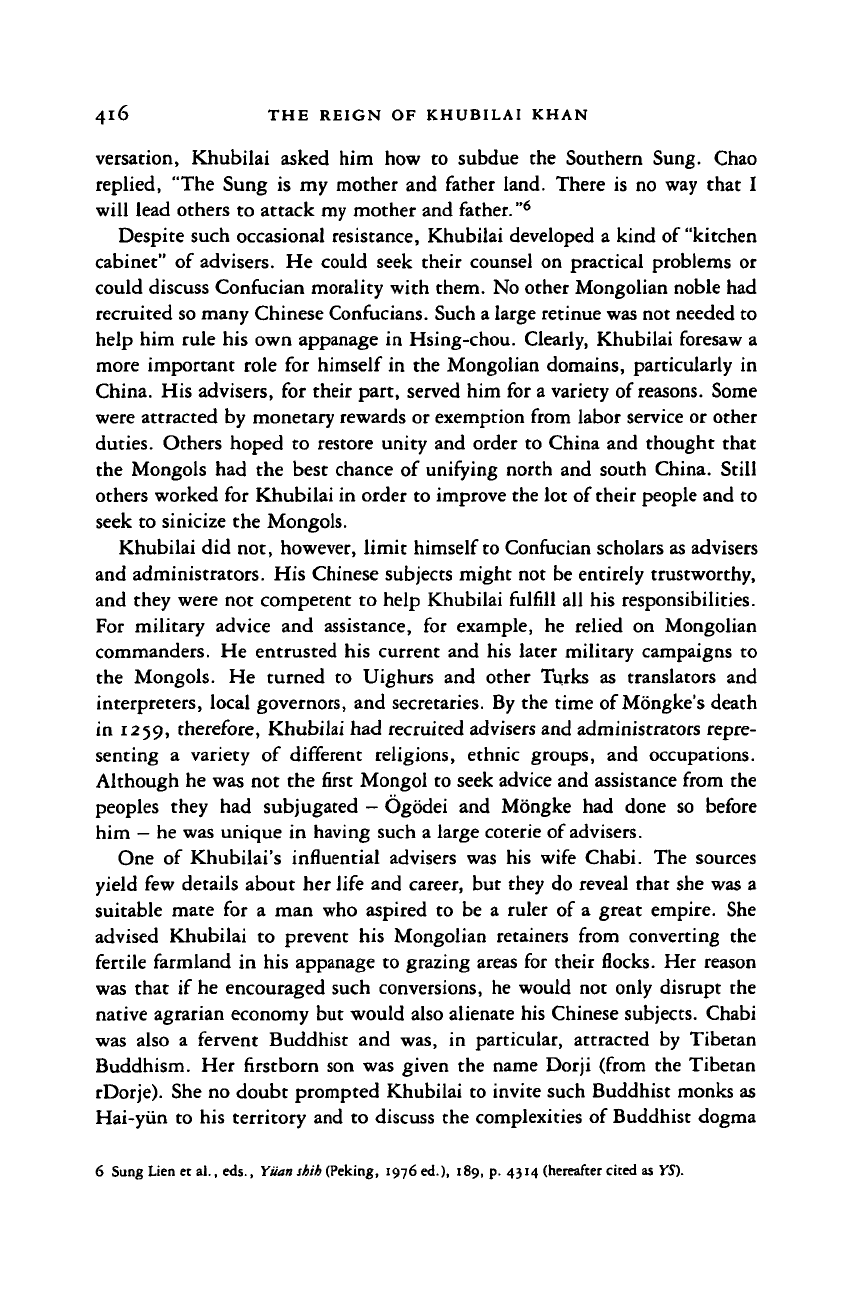
416 THE REIGN OF KHUBILAI KHAN
versation, Khubilai asked
him how to
subdue
the
Southern Sung. Chao
replied, "The Sung
is my
mother and father land. There
is no
way that
I
will lead others to attack my mother and father.
"
6
Despite such occasional resistance, Khubilai developed
a
kind of "kitchen
cabinet"
of
advisers.
He
could seek their counsel
on
practical problems
or
could discuss Confucian morality with them. No other Mongolian noble had
recruited so many Chinese Confucians. Such a large retinue was not needed to
help him rule his own appanage
in
Hsing-chou. Clearly, Khubilai foresaw
a
more important role
for
himself in the Mongolian domains, particularly
in
China. His advisers,
for
their part, served him for a variety of
reasons.
Some
were attracted by monetary rewards or exemption from labor service or other
duties. Others hoped
to
restore unity and order
to
China and thought that
the Mongols
had the
best chance
of
unifying north and south China. Still
others worked for Khubilai in order to improve the lot of their people and
to
seek to sinicize the Mongols.
Khubilai did not, however, limit himself to Confucian scholars as advisers
and administrators. His Chinese subjects might not be entirely trustworthy,
and they were not competent
to
help Khubilai fulfill all his responsibilities.
For military advice
and
assistance,
for
example,
he
relied
on
Mongolian
commanders.
He
entrusted his current and his later military campaigns
to
the Mongols.
He
turned
to
Uighurs
and
other Turks
as
translators
and
interpreters, local governors, and secretaries. By the time of Mongke's death
in 1259, therefore, Khubilai had recruited advisers and administrators repre-
senting
a
variety
of
different religions, ethnic groups,
and
occupations.
Although he was not the first Mongol to seek advice and assistance from the
peoples they
had
subjugated
-
Ogodei
and
Mongke
had
done
so
before
him
—
he was unique
in
having such a large coterie of advisers.
One
of
Khubilai's influential advisers was
his
wife Chabi. The sources
yield few details about her life and career, but they do reveal that she was
a
suitable mate
for a
man who aspired
to be a
ruler
of a
great empire.
She
advised Khubilai
to
prevent
his
Mongolian retainers from converting
the
fertile farmland
in
his appanage to grazing areas
for
their flocks. Her reason
was that
if
he encouraged such conversions, he would not only disrupt
the
native agrarian economy but would also alienate his Chinese subjects. Chabi
was also
a
fervent Buddhist
and
was,
in
particular, attracted
by
Tibetan
Buddhism.
Her
firstborn son was given
the
name Dorji (from the Tibetan
rDorje). She no doubt prompted Khubilai to invite such Buddhist monks as
Hai-yiin
to
his territory and
to
discuss the complexities of Buddhist dogma
6 Sung Lien et al., eds.,
Yuan shih
(Peking, 1976 ed.), 189, p. 4314 (hereafter cited as YS).
Cambridge Histories Online © Cambridge University Press, 2008
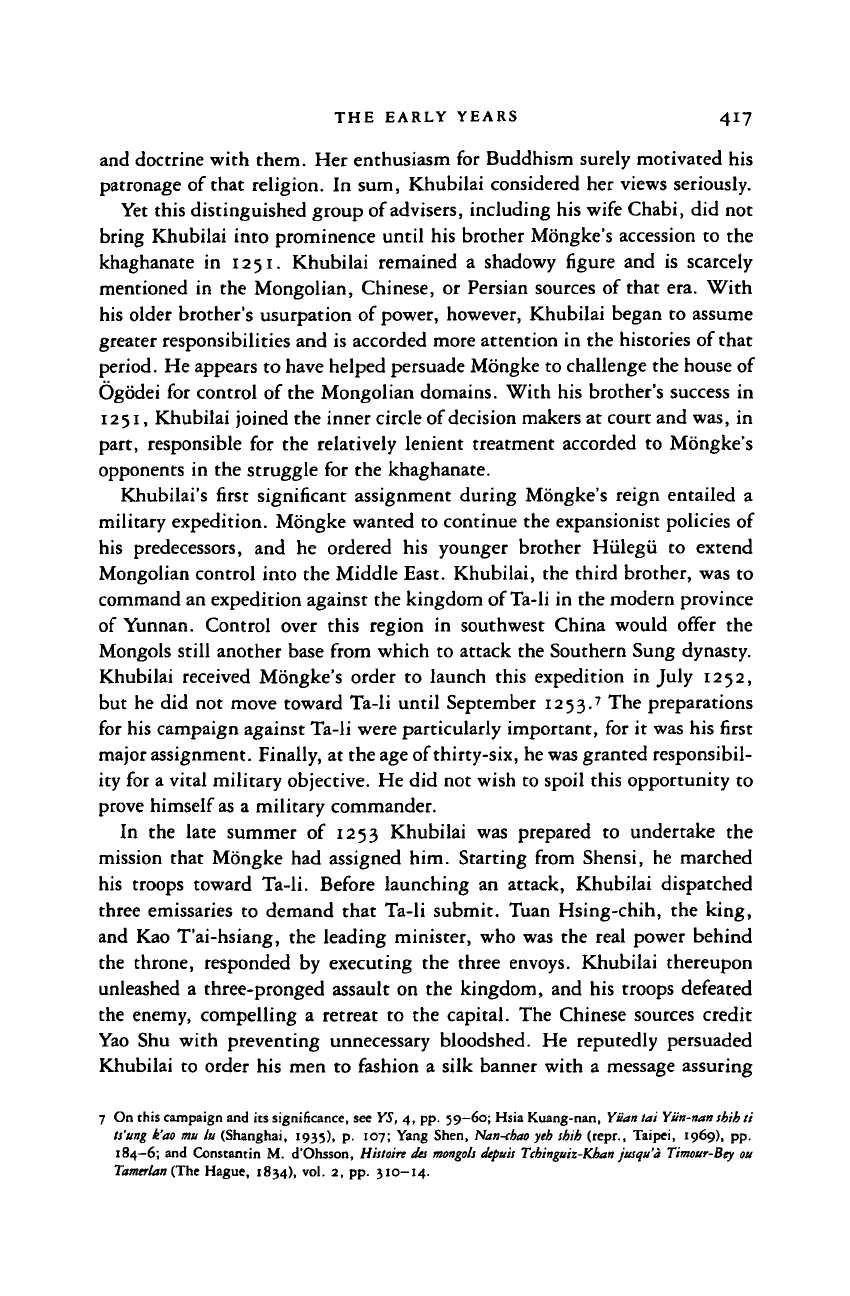
THE EARLY YEARS 417
and doctrine with them. Her enthusiasm for Buddhism surely motivated his
patronage of that religion. In sum, Khubilai considered her views seriously.
Yet this distinguished group of advisers, including his wife Chabi, did not
bring Khubilai into prominence until his brother Mongke's accession to the
khaghanate in 1251. Khubilai remained a shadowy figure and is scarcely
mentioned in the Mongolian, Chinese, or Persian sources of that era. With
his older brother's usurpation of power, however, Khubilai began to assume
greater responsibilities and is accorded more attention in the histories of that
period. He appears to have helped persuade Mongke to challenge the house of
Ogodei for control of the Mongolian domains. With his brother's success in
1251,
Khubilai joined the inner circle of decision makers at court and was, in
part, responsible for the relatively lenient treatment accorded to Mongke's
opponents in the struggle for the khaghanate.
Khubilai's first significant assignment during Mongke's reign entailed a
military expedition. Mongke wanted to continue the expansionist policies of
his predecessors, and he ordered his younger brother Hiilegii to extend
Mongolian control into the Middle East. Khubilai, the third brother, was to
command an expedition against the kingdom of Ta-li in the modern province
of Yunnan. Control over this region in southwest China would offer the
Mongols still another base from which to attack the Southern Sung dynasty.
Khubilai received Mongke's order to launch this expedition in July 1252,
but he did not move toward Ta-li until September
1253.
7
The preparations
for his campaign against Ta-li were particularly important, for it was his first
major assignment. Finally, at the age of thirty-six, he
was
granted responsibil-
ity for a vital military objective. He did not wish to spoil this opportunity to
prove himself
as
a military commander.
In the late summer of 1253 Khubilai was prepared to undertake the
mission that Mongke had assigned him. Starting from Shensi, he marched
his troops toward Ta-li. Before launching an attack, Khubilai dispatched
three emissaries to demand that Ta-li submit. Tuan Hsing-chih, the king,
and Kao T'ai-hsiang, the leading minister, who was the real power behind
the throne, responded by executing the three envoys. Khubilai thereupon
unleashed a three-pronged assault on the kingdom, and his troops defeated
the enemy, compelling a retreat to the capital. The Chinese sources credit
Yao Shu with preventing unnecessary bloodshed. He reputedly persuaded
Khubilai to order his men to fashion a silk banner with a message assuring
7 On this campaign and its significance, see YS, 4, pp. 59—60; Hsia Kuang-nan, Yuan tai Yun-nan sbih ti
ts'ung k'ao mu lu (Shanghai, 1935), p. 107; Yang Shen, Nan-chao yeh sbih (repr., Taipei, 1969), pp.
184-6; and Constantin M. d'Ohsson, Histoin da mmgols depuit Tchinguiz-Khan jusqu'a Timour-Bey ou
Tamerlan
(The Hague, 1834), vol. 2, pp. 310—14.
Cambridge Histories Online © Cambridge University Press, 2008
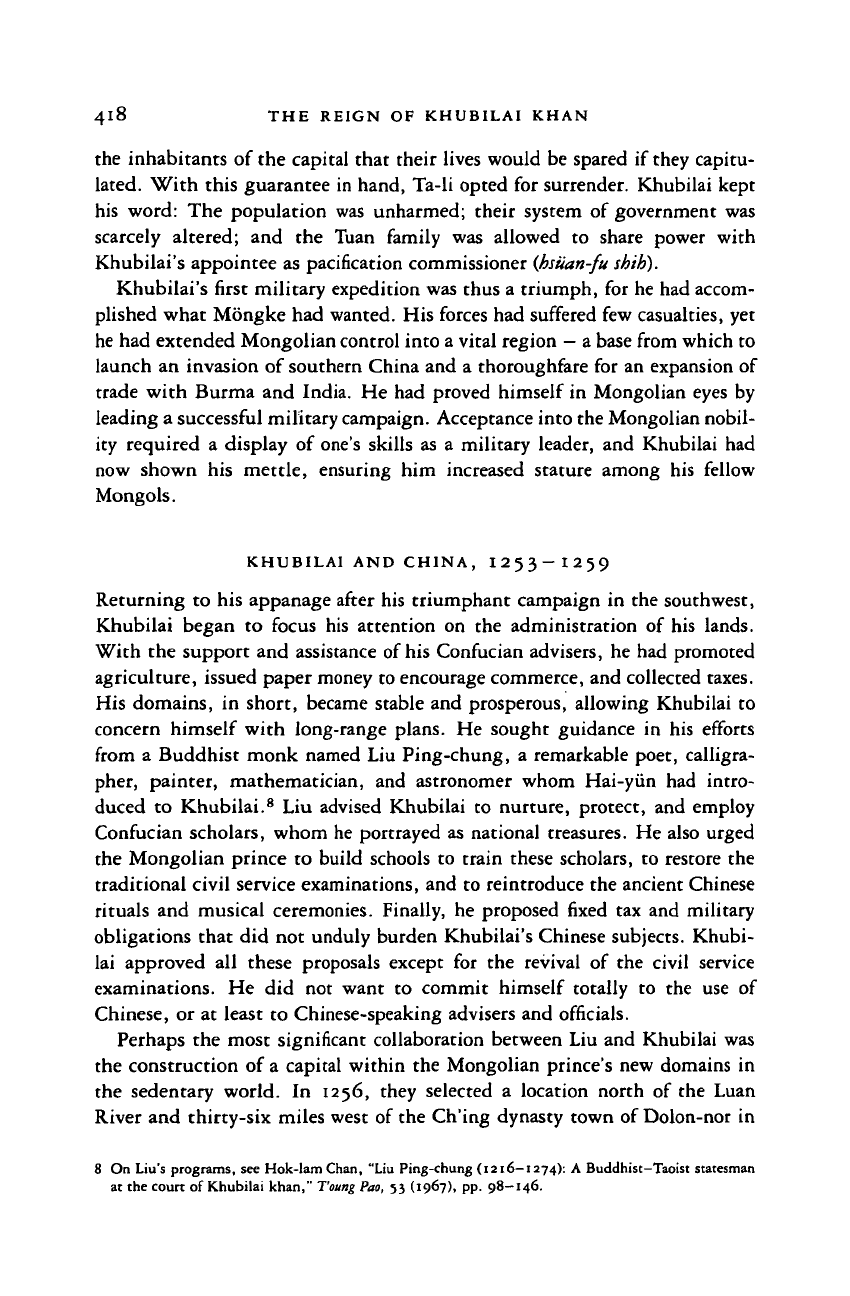
418
THE
REIGN
OF
KHUBILAI KHAN
the inhabitants
of
the capital that their lives would be spared
if
they capitu-
lated. With this guarantee in hand, Ta-li opted for surrender. Khubilai kept
his word:
The
population was unharmed; their system
of
government was
scarcely altered;
and the
Tuan family
was
allowed
to
share power with
Khubilai's appointee as pacification commissioner
(hsiian-fu
shih).
Khubilai's first military expedition was thus
a
triumph,
for
he had accom-
plished what Mongke had wanted. His forces had suffered few casualties,
yet
he had extended Mongolian control into a vital region
—
a base from which
to
launch
an
invasion
of
southern China and
a
thoroughfare
for
an expansion of
trade with Burma
and
India.
He
had proved himself in Mongolian eyes
by
leading a successful military campaign. Acceptance into the Mongolian nobil-
ity required
a
display
of
one's skills
as a
military leader,
and
Khubilai
had
now shown
his
mettle, ensuring
him
increased stature among
his
fellow
Mongols.
KHUBILAI AND CHINA, 1253-1259
Returning
to
his appanage after his triumphant campaign
in
the southwest,
Khubilai began
to
focus
his
attention
on the
administration
of
his lands.
With the support and assistance of his Confucian advisers, he had promoted
agriculture, issued paper money to encourage commerce, and collected taxes.
His domains,
in
short, became stable and prosperous, allowing Khubilai
to
concern himself with long-range plans.
He
sought guidance
in his
efforts
from
a
Buddhist monk named Liu Ping-chung,
a
remarkable poet, calligra-
pher, painter, mathematician,
and
astronomer whom Hai-yiin
had
intro-
duced
to
Khubilai.
8
Liu
advised Khubilai
to
nurture, protect,
and
employ
Confucian scholars, whom he portrayed as national treasures. He also urged
the Mongolian prince
to
build schools
to
train these scholars,
to
restore
the
traditional civil service examinations, and
to
reintroduce the ancient Chinese
rituals
and
musical ceremonies. Finally,
he
proposed fixed
tax
and military
obligations that
did not
unduly burden Khubilai's Chinese subjects. Khubi-
lai approved
all
these proposals except
for the
revival
of the
civil service
examinations.
He did not
want
to
commit himself totally
to the use of
Chinese,
or at
least
to
Chinese-speaking advisers and officials.
Perhaps
the
most significant collaboration between Liu and Khubilai was
the construction
of
a capital within the Mongolian prince's new domains
in
the sedentary world.
In
1256, they selected
a
location north
of
the Luan
River and thirty-six miles west
of
the Ch'ing dynasty town
of
Dolon-nor
in
8
On
Liu's programs,
see
Hok-lam Chan, "Liu Ping-chung (1216-1274):
A
Buddhist-Taoist statesman
at
the
court
of
Khubilai khan," Toung Pao,
53
(1967),
pp.
98—146.
Cambridge Histories Online © Cambridge University Press, 2008
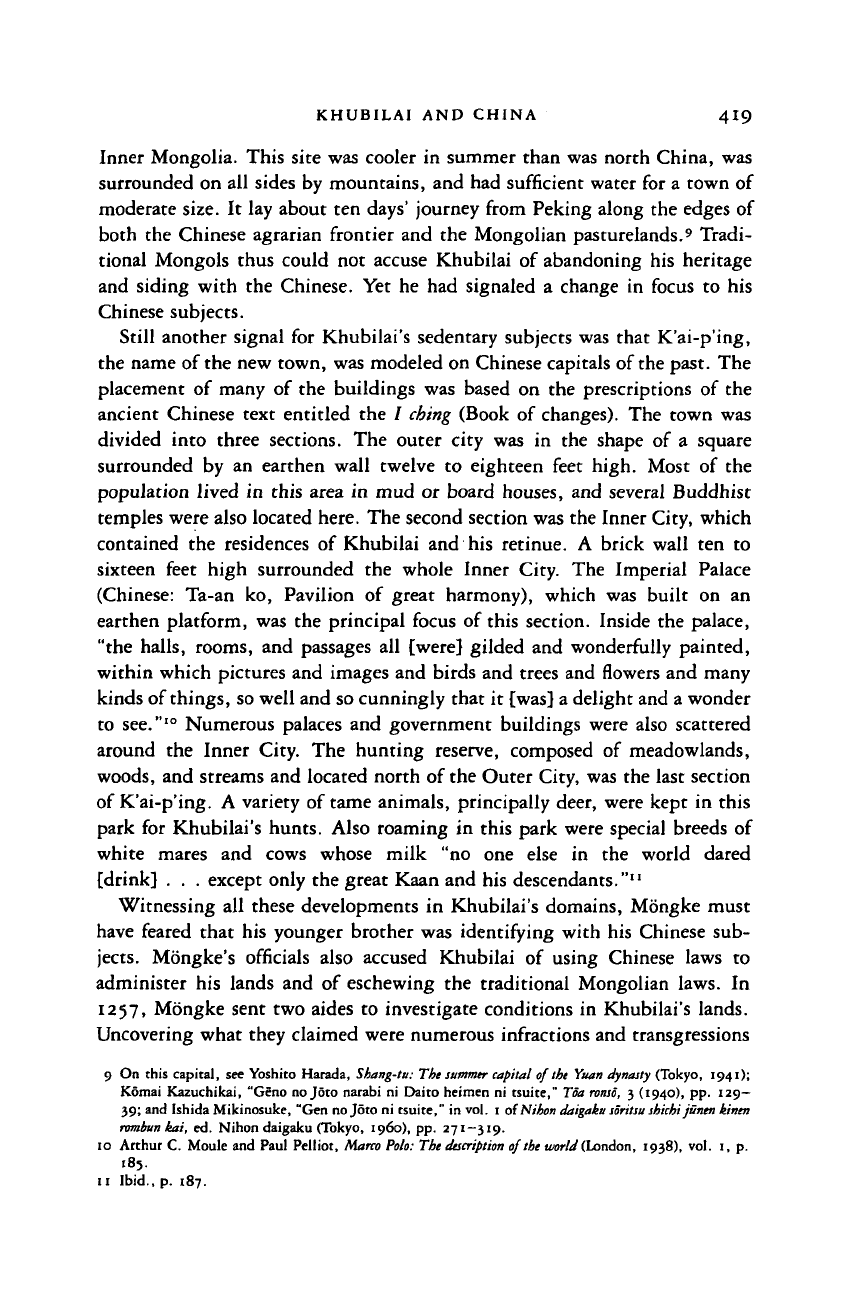
KHUBILAI AND CHINA 419
Inner Mongolia. This site was cooler in summer than was north China, was
surrounded on all sides by mountains, and had sufficient water for a town of
moderate size. It lay about ten days' journey from Peking along the edges of
both the Chinese agrarian frontier and the Mongolian pasturelands.
9
Tradi-
tional Mongols thus could not accuse Khubilai of abandoning his heritage
and siding with the Chinese. Yet he had signaled a change in focus to his
Chinese subjects.
Still another signal for Khubilai's sedentary subjects was that K'ai-p'ing,
the name of the new town, was modeled on Chinese capitals of the past. The
placement of many of the buildings was based on the prescriptions of the
ancient Chinese text entitled the / ching (Book of changes). The town was
divided into three sections. The outer city was in the shape of a square
surrounded by an earthen wall twelve to eighteen feet high. Most of the
population lived in this area in mud or board houses, and several Buddhist
temples were also located here. The second section was the Inner City, which
contained the residences of Khubilai and his retinue. A brick wall ten to
sixteen feet high surrounded the whole Inner City. The Imperial Palace
(Chinese: Ta-an ko, Pavilion of great harmony), which was built on an
earthen platform, was the principal focus of this section. Inside the palace,
"the halls, rooms, and passages all [were} gilded and wonderfully painted,
within which pictures and images and birds and trees and flowers and many
kinds of things, so well and so cunningly that it [was] a delight and a wonder
to see."
10
Numerous palaces and government buildings were also scattered
around the Inner City. The hunting reserve, composed of meadowlands,
woods, and streams and located north of the Outer City, was the last section
of K'ai-p'ing. A variety of tame animals, principally deer, were kept in this
park for Khubilai's hunts. Also roaming in this park were special breeds of
white mares and cows whose milk "no one else in the world dared
[drink] . . . except only the great Kaan and his descendants."
11
Witnessing all these developments in Khubilai's domains, Mongke must
have feared that his younger brother was identifying with his Chinese sub-
jects.
Mongke's officials also accused Khubilai of using Chinese laws to
administer his lands and of eschewing the traditional Mongolian laws. In
1257,
Mongke sent two aides to investigate conditions in Khubilai's lands.
Uncovering what they claimed were numerous infractions and transgressions
9 On this capital, see Yoshito Harada, Shang-tu: The
summer
capital of
the
Yuan dynasty (Tokyo, 1941);
Komai Kazuchikai, "Geno no Joto narabi ni Oaito heimen ni tsuite," Toa
rorno,
3 (1940), pp. 129—
39;
and Ishida Mikinosuke, "Gen no Joto ni tsuite," in vol. 1 of Nihon daigaku
soritsu
shichi junen kinen
rombun
tat, ed. Nihon daigaku (Tokyo, i960), pp. 271—319.
10 Atthut C. Moule and Paul Pelliot, Marco Polo: The
description
of
the
world (London, 1938), vol. 1, p.
.85.
11 Ibid., p. 187.
Cambridge Histories Online © Cambridge University Press, 2008
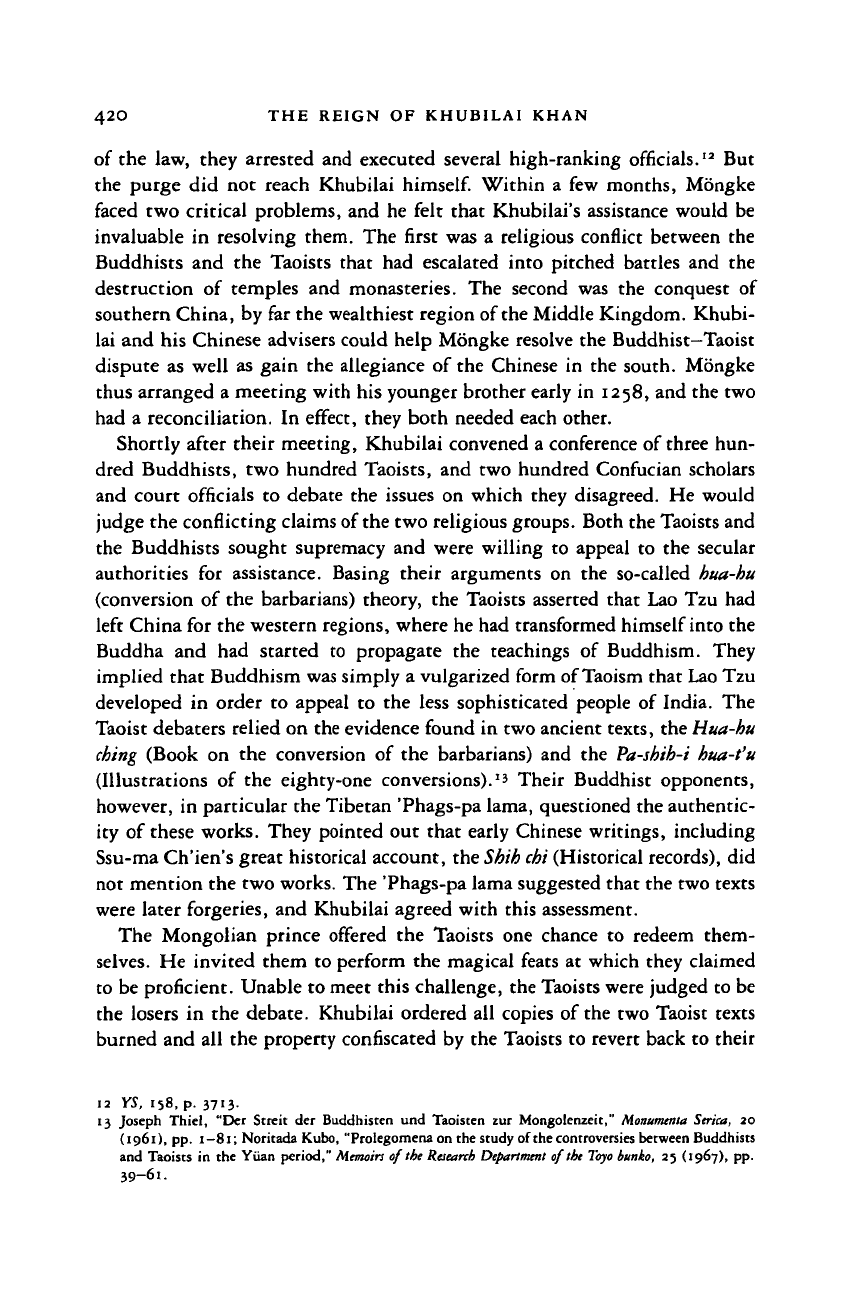
42O THE REIGN OF KHUBILAI KHAN
of the law, they arrested and executed several high-ranking officials.
12
But
the purge did not reach Khubilai
himself.
Within a few months, Mongke
faced two critical problems, and he felt that Khubilai's assistance would be
invaluable in resolving them. The first was a religious conflict between the
Buddhists and the Taoists that had escalated into pitched battles and the
destruction of temples and monasteries. The second was the conquest of
southern China, by far the wealthiest region of the Middle Kingdom. Khubi-
lai and his Chinese advisers could help Mongke resolve the Buddhist—Taoist
dispute as well as gain the allegiance of the Chinese in the south. Mongke
thus arranged a meeting with his younger brother early in 1258, and the two
had a reconciliation. In effect, they both needed each other.
Shortly after their meeting, Khubilai convened a conference of three hun-
dred Buddhists, two hundred Taoists, and two hundred Confucian scholars
and court officials to debate the issues on which they disagreed. He would
judge the conflicting claims of
the
two religious groups. Both the Taoists and
the Buddhists sought supremacy and were willing to appeal to the secular
authorities for assistance. Basing their arguments on the so-called bua-hu
(conversion of the barbarians) theory, the Taoists asserted that Lao Tzu had
left China for the western regions, where he had transformed himself
into
the
Buddha and had started to propagate the teachings of Buddhism. They
implied that Buddhism was simply a vulgarized form of Taoism that Lao Tzu
developed in order to appeal to the less sophisticated people of India. The
Taoist debaters relied on the evidence found in two ancient texts, the
Hua-hu
ching
(Book on the conversion of the barbarians) and the
Pa-shih-i
hua-t'u
(Illustrations of the eighty-one conversions).
13
Their Buddhist opponents,
however, in particular the Tibetan 'Phags-pa lama, questioned the authentic-
ity of these works. They pointed out that early Chinese writings, including
Ssu-ma Ch'ien's great historical account, the
Shih chi
(Historical records), did
not mention the two works. The 'Phags-pa lama suggested that the two texts
were later forgeries, and Khubilai agreed with this assessment.
The Mongolian prince offered the Taoists one chance to redeem them-
selves. He invited them to perform the magical feats at which they claimed
to be proficient. Unable to meet this challenge, the Taoists were judged to be
the losers in the debate. Khubilai ordered all copies of the two Taoist texts
burned and all the property confiscated by the Taoists to revert back to their
12 YS, 158, p. 3713.
13 Joseph Thiel, "Der Streit der Buddhisten und Taoisten zur Mongolenzeit," Monumenta Serica, 20
(1961),
pp. 1—81; Noritada Kubo, "Prolegomena on the study of the controversies between Buddhists
and Taoists in the Yuan period," Memoirs of the
Research
Department of
the Toyo
bunko,
25 O967), pp.
39-61.
Cambridge Histories Online © Cambridge University Press, 2008
